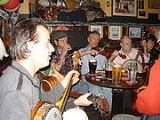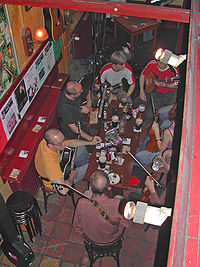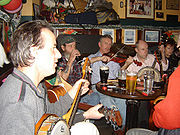
Irish traditional music session
Encyclopedia
Irish traditional music sessions are mostly informal gatherings at which people play Irish traditional music
. The Irish language
word for "session" is seisiún. This article discusses tune-playing, although "session" can also refer to a singing session or a mixed session (tunes and songs).
Barry Foy's Field Guide to the Irish Music Session defines a session as:
 The general session scheme is that someone starts a tune, and those who know it join in. Good session etiquette requires not playing if one does not know the tune, and waiting until a tune one knows comes along. In an "open" session, anyone who is able to play Irish music is welcome.
The general session scheme is that someone starts a tune, and those who know it join in. Good session etiquette requires not playing if one does not know the tune, and waiting until a tune one knows comes along. In an "open" session, anyone who is able to play Irish music is welcome.
Most often there are more-or-less recognized session leaders; sometimes there are no leaders. At times a song will be sung or a slow air played by a single musician between sets.
The objective in a session is not to provide music for an audience of passive listeners; although the punters (non-playing attendees) often come for the express purpose of listening, the music is most of all for the musicians themselves. The session is an experience that's shared, not a performance that's bought and sold.
The sessions are a key aspect of traditional music; some say it is the main sphere in which the music is formulated and innovated. Further, the sessions enable less advanced musicians to practice in a group.
Socially, sessions have often been compared to an evening of playing card games, where the conversation and camaraderie are an essential component. In many rural communities in Ireland, sessions are an integral part of community life.
s or all reels
, although on rare occasions and amongst a more skilled group of players a complementary tune of a different sort will be included, such as a slip jig
amongst the jig
s. Although bands sometimes arrange sets of reels and jigs together, this is uncommon in an Irish session context.
Some sets are specific to a locale, or even to a single session, whilst others, like the "Coleman set" of reels ("The Tarbolton"/"The Longford Collector"/The Sailor's Bonnet"), represent longstanding combinations that have been played together for decades. Sets are sometimes thrown together ad hoc, which sometimes works brilliantly and sometimes fails on the spot.
After the set ends, someone will usually start another.
 Sessions are usually held in public house
Sessions are usually held in public house
s. A pub owner might have one or two musicians paid to come regularly in order for the session to have a base. Sunday afternoons and weekday nights (especially Tuesday and Wednesday) are common times for sessions to be scheduled, on the theory that these are the least likely times for dances and concerts to be held, and therefore the times that professional musicians will be most able to show.
Sessions can be held in homes or at various public places in addition to pubs; often at a festival sessions will be got together in the beer tent or in the vendor's booth of a music-loving craftsman or dealer. When a particularly large musical event "takes over" an entire village, spontaneous sessions may erupt on the street corners. Sessions may also take place occasionally at wakes. House sessions are not as common now as they were in the past. This can be seen in the book Peig by Peig Sayers. In the early stages of the book when Peig was young they often went to sessions at peoples houses in a practice called 'ag bothántiocht'.
Folk music of Ireland
The folk music of Ireland is the generic term for music that has been created in various genres in Ireland.-History:...
. The Irish language
Irish language
Irish , also known as Irish Gaelic, is a Goidelic language of the Indo-European language family, originating in Ireland and historically spoken by the Irish people. Irish is now spoken as a first language by a minority of Irish people, as well as being a second language of a larger proportion of...
word for "session" is seisiún. This article discusses tune-playing, although "session" can also refer to a singing session or a mixed session (tunes and songs).
Barry Foy's Field Guide to the Irish Music Session defines a session as:
...a gathering of Irish traditional musicians for the purpose of celebrating their common interest in the music by playing it together in a relaxed, informal setting, while in the process generally beefing up the mystical cultural mantra that hums along uninterruptedly beneath all manifestations of Irishness worldwide.
Social and cultural aspects

Most often there are more-or-less recognized session leaders; sometimes there are no leaders. At times a song will be sung or a slow air played by a single musician between sets.
The objective in a session is not to provide music for an audience of passive listeners; although the punters (non-playing attendees) often come for the express purpose of listening, the music is most of all for the musicians themselves. The session is an experience that's shared, not a performance that's bought and sold.
The sessions are a key aspect of traditional music; some say it is the main sphere in which the music is formulated and innovated. Further, the sessions enable less advanced musicians to practice in a group.
Socially, sessions have often been compared to an evening of playing card games, where the conversation and camaraderie are an essential component. In many rural communities in Ireland, sessions are an integral part of community life.
Musical aspects
Typically, the first tune is followed by another two or three tunes in a set. The art of putting together a set is hard to put into words, but the tunes must flow from one to another in terms of key and melodic structure, without being so similar as to all sound the same. The tunes of a set will usually all be of the same sort, i.e. all jigJig
The Jig is a form of lively folk dance, as well as the accompanying dance tune, originating in England in the 16th century and today most associated with Irish dance music and Scottish country dance music...
s or all reels
Reel (dance)
The reel is a folk dance type as well as the accompanying dance tune type. In Scottish country dancing, the reel is one of the four traditional dances, the others being the jig, the strathspey and the waltz, and is also the name of a dance figure ....
, although on rare occasions and amongst a more skilled group of players a complementary tune of a different sort will be included, such as a slip jig
Slip jig
Slip jig refers to both a style within Irish music, and the Irish dance to music in slip-jig time. The slip jig is in 9/8 time, traditionally with accents on 5 of the 9 beats — two pairs of crotchet/quaver followed by a dotted crotchet note.The slip jig is one the four most common Irish...
amongst the jig
Jig
The Jig is a form of lively folk dance, as well as the accompanying dance tune, originating in England in the 16th century and today most associated with Irish dance music and Scottish country dance music...
s. Although bands sometimes arrange sets of reels and jigs together, this is uncommon in an Irish session context.
Some sets are specific to a locale, or even to a single session, whilst others, like the "Coleman set" of reels ("The Tarbolton"/"The Longford Collector"/The Sailor's Bonnet"), represent longstanding combinations that have been played together for decades. Sets are sometimes thrown together ad hoc, which sometimes works brilliantly and sometimes fails on the spot.
After the set ends, someone will usually start another.
Locations and Times

Public house
A public house, informally known as a pub, is a drinking establishment fundamental to the culture of Britain, Ireland, Australia and New Zealand. There are approximately 53,500 public houses in the United Kingdom. This number has been declining every year, so that nearly half of the smaller...
s. A pub owner might have one or two musicians paid to come regularly in order for the session to have a base. Sunday afternoons and weekday nights (especially Tuesday and Wednesday) are common times for sessions to be scheduled, on the theory that these are the least likely times for dances and concerts to be held, and therefore the times that professional musicians will be most able to show.
Sessions can be held in homes or at various public places in addition to pubs; often at a festival sessions will be got together in the beer tent or in the vendor's booth of a music-loving craftsman or dealer. When a particularly large musical event "takes over" an entire village, spontaneous sessions may erupt on the street corners. Sessions may also take place occasionally at wakes. House sessions are not as common now as they were in the past. This can be seen in the book Peig by Peig Sayers. In the early stages of the book when Peig was young they often went to sessions at peoples houses in a practice called 'ag bothántiocht'.
See also
- List of All-Ireland Champions
- Irish traditional musicFolk music of IrelandThe folk music of Ireland is the generic term for music that has been created in various genres in Ireland.-History:...
- Pub sessionPub sessionA pub session refers to playing music and/or singing in the relaxed social setting of a local pub, in which the music-making is intermingled with the consumption of ale, stout, and beer and conversation...

